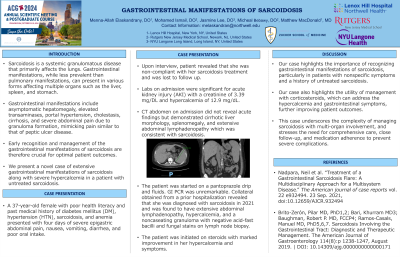Sunday Poster Session
Category: Small Intestine
P1584 - Gastrointestinal Manifestations of Sarcoidosis: A Case Report
Sunday, October 27, 2024
3:30 PM - 7:00 PM ET
Location: Exhibit Hall E

Has Audio

Menna-Allah Elaskandrany, DO
Lenox Hill Hospital, Northwell Health, NY
Presenting Author(s)
Menna-Allah Elaskandrany, DO1, Mohamed Ismail, DO2, Jasmine Lee, DO3, Micheal Bebawy, DO2, Matthew MacDonald, MD4
1Lenox Hill Hospital, Northwell Health, Astoria, NY; 2Rutgers New Jersey Medical School, Newark, NJ; 3NYU Langone Health, New York, NY; 4Lenox Hill Hospital, Northwell Health, New York, NY
Introduction: Sarcoidosis is a systemic granulomatous disease that primarily affects the lungs. Gastrointestinal manifestations, while less prevalent than pulmonary manifestations, can present in various forms affecting multiple organs such as the liver, spleen, and stomach. These manifestations include asymptomatic hepatomegaly, transaminitis, portal hypertension, cholestasis, cirrhosis, and severe abdominal pain due to granuloma formation, mimicking pain similar to that of peptic ulcer disease. Early recognition and management of the gastrointestinal manifestations of sarcoidosis are therefore crucial for optimal patient outcomes. We present a novel case of extensive gastrointestinal manifestations of sarcoidosis along with severe hypercalcemia in a patient with untreated sarcoidosis.
Case Description/Methods: A 37-year-old female with poor health literacy and past medical history of diabetes mellitus, hypertension, sarcoidosis, and anemia presented with four days of severe epigastric abdominal pain, nausea, vomiting, diarrhea, and poor oral intake. Upon interview, patient revealed that she was non-compliant with her sarcoidosis treatment and was lost to follow up. Labs on admission were significant for acute kidney injury (AKI) with a creatinine of 3.39 mg/DL and hypercalcemia of 12.9 mg/dL.
CT abdomen on admission did not reveal acute findings but demonstrated cirrhotic liver morphology, splenomegaly, and extensive abdominal lymphadenopathy which was consistent with sarcoidosis. The patient was started on a pantoprazole drip and fluids. GI PCR was unremarkable. Collateral obtained from a prior hospitalization revealed that she was diagnosed with sarcoidosis in 2021 and was found to have extensive abdominal lymphadenopathy, hypercalcemia, and a noncaseating granuloma with negative acid fast bacilli and fungal stains on lymph node biopsy. The patient was initiated on steroids with marked improvement in her hypercalcemia and symptoms.
Discussion: Our case highlights the importance of recognizing gastrointestinal manifestations of sarcoidosis, particularly in patients with nonspecific symptoms and a history of untreated sarcoidosis. Our case highlights the utility of management with corticosteroids, which can address the hypercalcemia and gastrointestinal symptoms, further improving patient outcomes. This case underscores the complexity of managing sarcoidosis with multi-organ involvement, and stressed the need for comprehensive care, close follow-up, and medication adherence to prevent severe complications.
Disclosures:
Menna-Allah Elaskandrany, DO1, Mohamed Ismail, DO2, Jasmine Lee, DO3, Micheal Bebawy, DO2, Matthew MacDonald, MD4. P1584 - Gastrointestinal Manifestations of Sarcoidosis: A Case Report, ACG 2024 Annual Scientific Meeting Abstracts. Philadelphia, PA: American College of Gastroenterology.
1Lenox Hill Hospital, Northwell Health, Astoria, NY; 2Rutgers New Jersey Medical School, Newark, NJ; 3NYU Langone Health, New York, NY; 4Lenox Hill Hospital, Northwell Health, New York, NY
Introduction: Sarcoidosis is a systemic granulomatous disease that primarily affects the lungs. Gastrointestinal manifestations, while less prevalent than pulmonary manifestations, can present in various forms affecting multiple organs such as the liver, spleen, and stomach. These manifestations include asymptomatic hepatomegaly, transaminitis, portal hypertension, cholestasis, cirrhosis, and severe abdominal pain due to granuloma formation, mimicking pain similar to that of peptic ulcer disease. Early recognition and management of the gastrointestinal manifestations of sarcoidosis are therefore crucial for optimal patient outcomes. We present a novel case of extensive gastrointestinal manifestations of sarcoidosis along with severe hypercalcemia in a patient with untreated sarcoidosis.
Case Description/Methods: A 37-year-old female with poor health literacy and past medical history of diabetes mellitus, hypertension, sarcoidosis, and anemia presented with four days of severe epigastric abdominal pain, nausea, vomiting, diarrhea, and poor oral intake. Upon interview, patient revealed that she was non-compliant with her sarcoidosis treatment and was lost to follow up. Labs on admission were significant for acute kidney injury (AKI) with a creatinine of 3.39 mg/DL and hypercalcemia of 12.9 mg/dL.
CT abdomen on admission did not reveal acute findings but demonstrated cirrhotic liver morphology, splenomegaly, and extensive abdominal lymphadenopathy which was consistent with sarcoidosis. The patient was started on a pantoprazole drip and fluids. GI PCR was unremarkable. Collateral obtained from a prior hospitalization revealed that she was diagnosed with sarcoidosis in 2021 and was found to have extensive abdominal lymphadenopathy, hypercalcemia, and a noncaseating granuloma with negative acid fast bacilli and fungal stains on lymph node biopsy. The patient was initiated on steroids with marked improvement in her hypercalcemia and symptoms.
Discussion: Our case highlights the importance of recognizing gastrointestinal manifestations of sarcoidosis, particularly in patients with nonspecific symptoms and a history of untreated sarcoidosis. Our case highlights the utility of management with corticosteroids, which can address the hypercalcemia and gastrointestinal symptoms, further improving patient outcomes. This case underscores the complexity of managing sarcoidosis with multi-organ involvement, and stressed the need for comprehensive care, close follow-up, and medication adherence to prevent severe complications.
Disclosures:
Menna-Allah Elaskandrany indicated no relevant financial relationships.
Mohamed Ismail indicated no relevant financial relationships.
Jasmine Lee indicated no relevant financial relationships.
Micheal Bebawy indicated no relevant financial relationships.
Matthew MacDonald indicated no relevant financial relationships.
Menna-Allah Elaskandrany, DO1, Mohamed Ismail, DO2, Jasmine Lee, DO3, Micheal Bebawy, DO2, Matthew MacDonald, MD4. P1584 - Gastrointestinal Manifestations of Sarcoidosis: A Case Report, ACG 2024 Annual Scientific Meeting Abstracts. Philadelphia, PA: American College of Gastroenterology.
